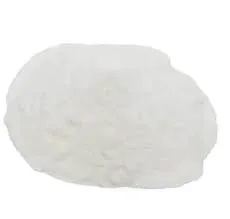
Nov . 18, 2024 14:23 Back to list
Hydroxyethyl Cellulose Applications and Properties in Various Industries and Formulations
Understanding Hydroxyethyl Cellulose CAS Number and Applications
Hydroxyethyl cellulose (HEC) is a non-ionic, water-soluble polymer derived from cellulose, a natural polymer obtained from plant sources. Recognized by its Chemical Abstracts Service (CAS) number 9004-62-0, HEC has gained significant recognition for its versatility and efficacy in various industrial, cosmetic, and pharmaceutical applications. This article explores its properties, applications, and significance in modern technology.
Properties of Hydroxyethyl Cellulose
Hydroxyethyl cellulose is created through the etherification of cellulose, which leads to the introduction of hydroxyethyl groups into the cellulose molecule. This modification enhances its solubility in water and allows it to form viscous solutions, making it valuable in products requiring thickening and stabilizing agents. One of the key characteristics of HEC is its outstanding ability to retain water, imparting hydration to formulations. HEC is also a pseudoplastic substance; its viscosity decreases under shear stress, allowing for easy application in various formulations.
The molecular weight of HEC can vary significantly, which influences its viscosity and other properties. Low molecular weight HEC solutions exhibit relatively low viscosity, while high molecular weight solutions become highly viscous. This tunable viscosity makes HEC suitable for a wide range of formulations from low-viscosity solutions to heavy gels.
Applications of Hydroxyethyl Cellulose
1. Cosmetics and Personal Care HEC is extensively used in the cosmetic industry as a thickener, emulsifier, and stabilizer. It is commonly found in shampoos, conditioners, lotions, creams, and gels. Its ability to enhance the texture and improve the viscosity of products is crucial for consumer appeal. Moreover, HEC is known for its compatibility with various surfactants and cosmetic ingredients, making it a preferred choice for product formulators.
hydroxyethyl cellulose cas number

2. Pharmaceuticals In the pharmaceutical sector, HEC serves multiple roles. It is used as a binder in tablet formulations, a stabilizer in suspensions, and a thickening agent in topical gels. Its non-toxic nature and ability to form hydrogels make HEC suitable for drug delivery systems, providing controlled release of active ingredients. Additionally, HEC is often used in the formulation of ophthalmic solutions, where clarity and viscosity are critical.
3. Building and Construction Hydroxyethyl cellulose is utilized in the building industry, particularly in the formulation of cement-based products, paints, and coatings. It enhances the workability and adhesion of these materials, ensuring better application and finish. HEC also acts as a water retention agent, which is vital in preventing cracking and improving the durability of mortar and plaster.
4. Food Industry Although less common, HEC finds use as a thickening agent in various food products. It can help improve texture and stability in products like sauces, dressings, and dairy items. Its neutral taste and non-toxic properties make it a safe additive.
5. Agriculture In agriculture, HEC is used in the formulation of seed coatings and pesticide delivery systems. Its water-retaining properties help ensure that the active ingredients are released effectively, improving crop yield and plant health.
Significance of Hydroxyethyl Cellulose
With the growing demand for biodegradable and natural products, HEC stands out as a sustainable alternative to synthetic polymers. Its renewable source and bio-compatibility align with current trends in environmentally friendly formulations across various sectors. As awareness about the environmental impact of chemicals increases, HEC is projected to gain further traction in industries that are shifting towards sustainable practices.
In conclusion, hydroxyethyl cellulose (CAS 9004-62-0) is an essential polymer with a wide range of applications across multiple industries. Its unique properties make it invaluable in cosmetics, pharmaceuticals, construction, food, and agriculture. As advancements in formulation technology continue to evolve, HEC is likely to play a crucial role in developing innovative solutions that meet both consumer demands and environmental sustainability. Whether it's enhancing the efficacy of beauty products or ensuring the effectiveness of medications, hydroxyethyl cellulose remains a versatile ingredient that continues to shape various industries.
-
Versatile Hpmc Uses in Different Industries
NewsJun.19,2025
-
Redispersible Powder's Role in Enhancing Durability of Construction Products
NewsJun.19,2025
-
Hydroxyethyl Cellulose Applications Driving Green Industrial Processes
NewsJun.19,2025
-
Exploring Different Redispersible Polymer Powder
NewsJun.19,2025
-
Choosing the Right Mortar Bonding Agent
NewsJun.19,2025
-
Applications and Significance of China Hpmc in Modern Industries
NewsJun.19,2025







